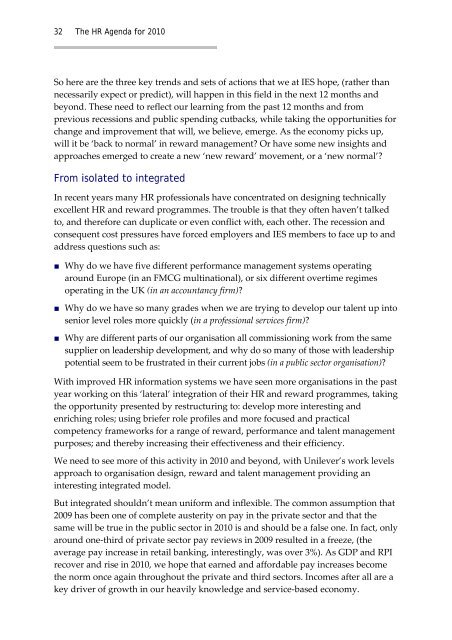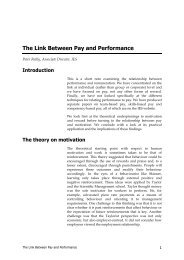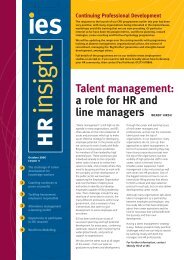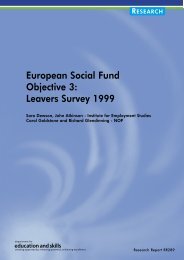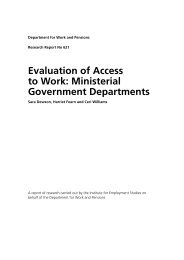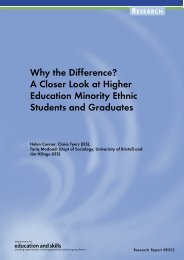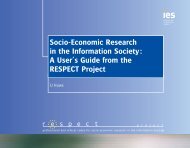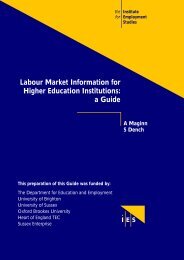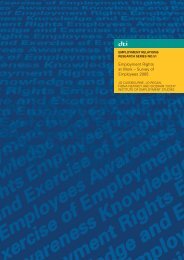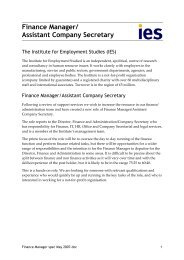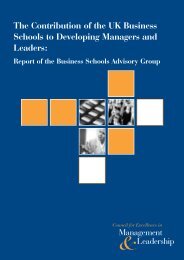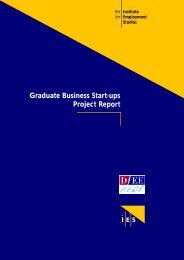PDF of this item - The Institute for Employment Studies
PDF of this item - The Institute for Employment Studies
PDF of this item - The Institute for Employment Studies
- No tags were found...
Create successful ePaper yourself
Turn your PDF publications into a flip-book with our unique Google optimized e-Paper software.
32 <strong>The</strong> HR Agenda <strong>for</strong> 2010So here are the three key trends and sets <strong>of</strong> actions that we at IES hope, (rather thannecessarily expect or predict), will happen in <strong>this</strong> field in the next 12 months andbeyond. <strong>The</strong>se need to reflect our learning from the past 12 months and fromprevious recessions and public spending cutbacks, while taking the opportunities <strong>for</strong>change and improvement that will, we believe, emerge. As the economy picks up,will it be ‘back to normal’ in reward management? Or have some new insights andapproaches emerged to create a new ‘new reward’ movement, or a ‘new normal’?From isolated to integratedIn recent years many HR pr<strong>of</strong>essionals have concentrated on designing technicallyexcellent HR and reward programmes. <strong>The</strong> trouble is that they <strong>of</strong>ten haven’t talkedto, and there<strong>for</strong>e can duplicate or even conflict with, each other. <strong>The</strong> recession andconsequent cost pressures have <strong>for</strong>ced employers and IES members to face up to andaddress questions such as:■ Why do we have five different per<strong>for</strong>mance management systems operatingaround Europe (in an FMCG multinational), or six different overtime regimesoperating in the UK (in an accountancy firm)?■ Why do we have so many grades when we are trying to develop our talent up intosenior level roles more quickly (in a pr<strong>of</strong>essional services firm)?■ Why are different parts <strong>of</strong> our organisation all commissioning work from the samesupplier on leadership development, and why do so many <strong>of</strong> those with leadershippotential seem to be frustrated in their current jobs (in a public sector organisation)?With improved HR in<strong>for</strong>mation systems we have seen more organisations in the pastyear working on <strong>this</strong> ‘lateral’ integration <strong>of</strong> their HR and reward programmes, takingthe opportunity presented by restructuring to: develop more interesting andenriching roles; using briefer role pr<strong>of</strong>iles and more focused and practicalcompetency frameworks <strong>for</strong> a range <strong>of</strong> reward, per<strong>for</strong>mance and talent managementpurposes; and thereby increasing their effectiveness and their efficiency.We need to see more <strong>of</strong> <strong>this</strong> activity in 2010 and beyond, with Unilever’s work levelsapproach to organisation design, reward and talent management providing aninteresting integrated model.But integrated shouldn’t mean uni<strong>for</strong>m and inflexible. <strong>The</strong> common assumption that2009 has been one <strong>of</strong> complete austerity on pay in the private sector and that thesame will be true in the public sector in 2010 is and should be a false one. In fact, onlyaround one‐third <strong>of</strong> private sector pay reviews in 2009 resulted in a freeze, (theaverage pay increase in retail banking, interestingly, was over 3%). As GDP and RPIrecover and rise in 2010, we hope that earned and af<strong>for</strong>dable pay increases becomethe norm once again throughout the private and third sectors. Incomes after all are akey driver <strong>of</strong> growth in our heavily knowledge and service‐based economy.


